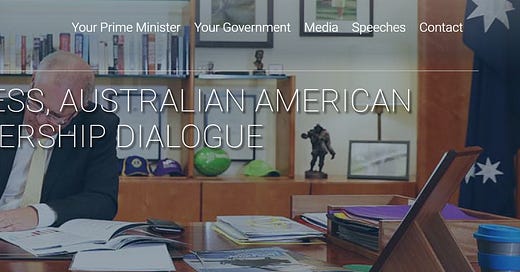A pox on both your houses
Prime Minister Scott Morrison delivering a virtual address at the Australian American Leadership Dialogue on 11 August:
“Unlike the Cold War, geostrategic competition in the coming decades will be engaged in the economic realm. Our recent experience with economic coercion underlines that. That’s why I believe our bilateral strategic cooperation must extend to economic matters. We should consider a regular Strategic Economic Dialogue between our most senior key economic and trade officials. Now, more than ever, we need to be working closely together on the common economic challenges that confront us. And, you know, we’ve got to deal with the hard stuff. We’ve got to deal with the reform of the World Trade Organization. We’ve got to deal with ensuring that there is a working appellate system that ensures that the rules of trade work because where there is [sic] no rules, others will seek to exploit and take advantage, and we know all about that down here in Australia with what we’re confronting. So we need a working WTO system to ensure that we have a working world trade system that we can rely on to ensure that no country, no country suffers any exploitation against its interests, as we are seeing at present.”
Quick take:
There’s a lot going on in this para. On one level, it’s a call for deeper and more strategic economic coordination between Washington and Canberra to confront Beijing’s coercive economic statecraft, among other shared goals. But on another level, it’s a rhetorical broadside at the Biden administration’s failure to reverse course on the obstructionist US approach to the WTO.
Prime Minister Morrison’s two-level message succinctly captures Australia’s economic and diplomatic bind. Faced with China’s economic coercion, Australia is seeking US support. Yet the international architecture that supports Australia’s multilateral method of choice for combatting China’s coercive practices is being undermined by the US spoiler role in the WTO Appellate Body.
Calling out economic coercion X4
US Department of State media note from 12 August on the latest Quad Senior Officials Meeting:
“The officials examined ways to advance ongoing cooperation on numerous topics of mutual interest, including strategic challenges confronting the region, countering disinformation, promoting democracy and human rights, strengthening international institutions including the United Nations and related organizations, and supporting countries vulnerable to coercive actions in the Indo-Pacific region.”
Quick take:
This reference to coercion is framed in general terms. But Beijing probably saw this as an unmistakable reference to its 15-month-old effort to economically coerce Canberra.
Will these kinds of obliquely expressed Quad concerns about coercion change Beijing’s approach to Canberra? Almost certainly not. But these kinds of statements about coercion nevertheless highlight the Quad’s growing utility for Australia.
Getting three major resident powers in the Indo-Pacific to jointly highlight the issue of coercive statecraft is a diplomatic win for Australia, even if the highlighting leaves some specificity to the imagination.
Mutually assured economic inefficiencies
Excerpt from the Productivity Commission’s report Vulnerable Supply Chains, which was released publicly on 13 August:
“On its own, iron ore accounted for nearly 95 per cent of the value of all vulnerable exports in 2019. It has been the largest source of Australian export revenue for the last decade; over 80 per cent has been exported to China in recent years, and China regularly accounts for over two thirds of global imports of iron ore. This makes both Australia and China vulnerable to disruptions in the iron ore market. It is equally a situation that lessens the risk of geopolitically-inspired disruptions, as the two economies have a vested interest in the efficient functioning of the market for iron ore.”
“The economic impact from a downstream disruption to Australia’s exports depends on how quickly markets adjust, which in turn will depend on the nature of the product. For example, the experience following the recent restrictions placed on some Australian exports by the Chinese government has shown that products like coal (which is not identified as vulnerable) can quickly find new markets while others, such as rock lobsters (identified as vulnerable) have greater difficulty.”
“The difficulty that exporters face in expanding to alternative export markets is a function of many factors not fully captured in our analysis of global trade data. For instance, the costs of finding new customers will likely be smaller for standardised commodity products like coal than for differentiated products like wine (which require significant marketing and reputation development).”
Quick take:
This tells a sobering story for Beijing. China’s trade restrictions have caused acute points of pain for select Australian exporters and the communities they sustain. But at the macro level, Australian exports have been able to redirect to alternative markets, albeit with price pressures and extra costs associated with moving to other markets.
Accepting that China probably won’t want to hit Australian iron ore exports for self-interested reasons, big questions remain about Australia’s largest services exports: education and tourism. These exports were among the four flagged as potential targets of Chinese consumers’ discontent in the wake of Canberra’s call in April 2020 for an inquiry into the origins of COVID-19.
Unlike the Australian commodity exports targeted to date, which have in most cases redirected to alternative markets, education and tourism very much fit the bill of differentiated products that “require significant marketing and reputation development.” COVID-19 and associated border closures have meant tourism and education are not appealing targets for Beijing’s economic coercion for now. But this Productivity Commission analysis once again highlights that these services exports remain especially vulnerable to future economic coercion.
As always, thank you for reading and please excuse any errors (typographical or otherwise). Any and all objections, criticisms, and corrections very much appreciated.




